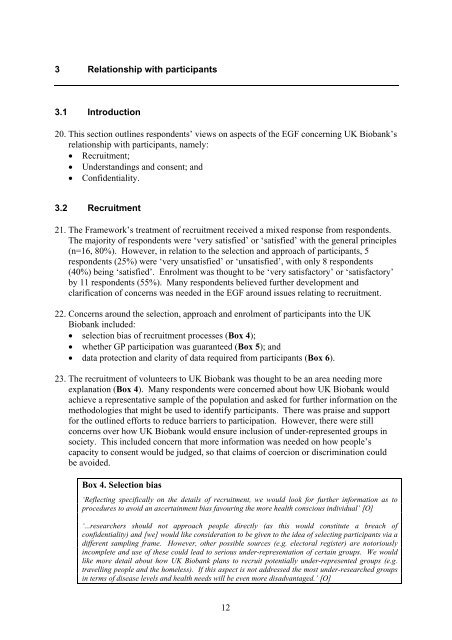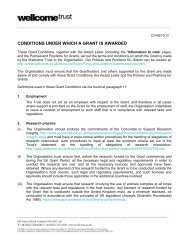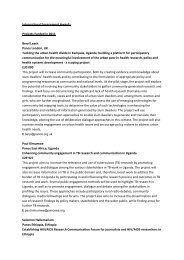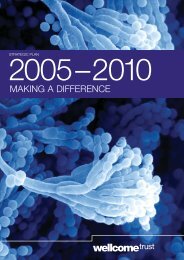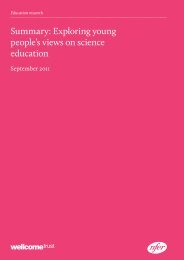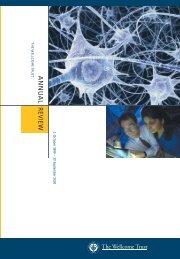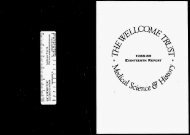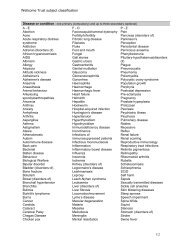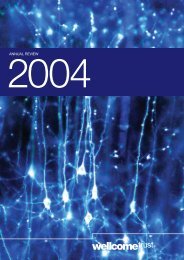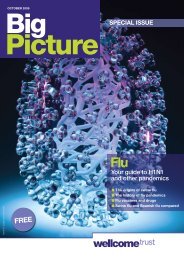UK BIOBANK Ethics and Governance Framework ... - Wellcome Trust
UK BIOBANK Ethics and Governance Framework ... - Wellcome Trust
UK BIOBANK Ethics and Governance Framework ... - Wellcome Trust
You also want an ePaper? Increase the reach of your titles
YUMPU automatically turns print PDFs into web optimized ePapers that Google loves.
3 Relationship with participants3.1 Introduction20. This section outlines respondents’ views on aspects of the EGF concerning <strong>UK</strong> Biobank’srelationship with participants, namely:• Recruitment;• Underst<strong>and</strong>ings <strong>and</strong> consent; <strong>and</strong>• Confidentiality.3.2 Recruitment21. The <strong>Framework</strong>’s treatment of recruitment received a mixed response from respondents.The majority of respondents were ‘very satisfied’ or ‘satisfied’ with the general principles(n=16, 80%). However, in relation to the selection <strong>and</strong> approach of participants, 5respondents (25%) were ‘very unsatisfied’ or ‘unsatisfied’, with only 8 respondents(40%) being ‘satisfied’. Enrolment was thought to be ‘very satisfactory’ or ‘satisfactory’by 11 respondents (55%). Many respondents believed further development <strong>and</strong>clarification of concerns was needed in the EGF around issues relating to recruitment.22. Concerns around the selection, approach <strong>and</strong> enrolment of participants into the <strong>UK</strong>Biobank included:• selection bias of recruitment processes (Box 4);• whether GP participation was guaranteed (Box 5); <strong>and</strong>• data protection <strong>and</strong> clarity of data required from participants (Box 6).23. The recruitment of volunteers to <strong>UK</strong> Biobank was thought to be an area needing moreexplanation (Box 4). Many respondents were concerned about how <strong>UK</strong> Biobank wouldachieve a representative sample of the population <strong>and</strong> asked for further information on themethodologies that might be used to identify participants. There was praise <strong>and</strong> supportfor the outlined efforts to reduce barriers to participation. However, there were stillconcerns over how <strong>UK</strong> Biobank would ensure inclusion of under-represented groups insociety. This included concern that more information was needed on how people’scapacity to consent would be judged, so that claims of coercion or discrimination couldbe avoided.Box 4. Selection bias‘Reflecting specifically on the details of recruitment, we would look for further information as toprocedures to avoid an ascertainment bias favouring the more health conscious individual’ [O]‘...researchers should not approach people directly (as this would constitute a breach ofconfidentiality) <strong>and</strong> [we] would like consideration to be given to the idea of selecting participants via adifferent sampling frame. However, other possible sources (e.g. electoral register) are notoriouslyincomplete <strong>and</strong> use of these could lead to serious under-representation of certain groups. We wouldlike more detail about how <strong>UK</strong> Biobank plans to recruit potentially under-represented groups (e.g.travelling people <strong>and</strong> the homeless). If this aspect is not addressed the most under-researched groupsin terms of disease levels <strong>and</strong> health needs will be even more disadvantaged.’ [O]12


